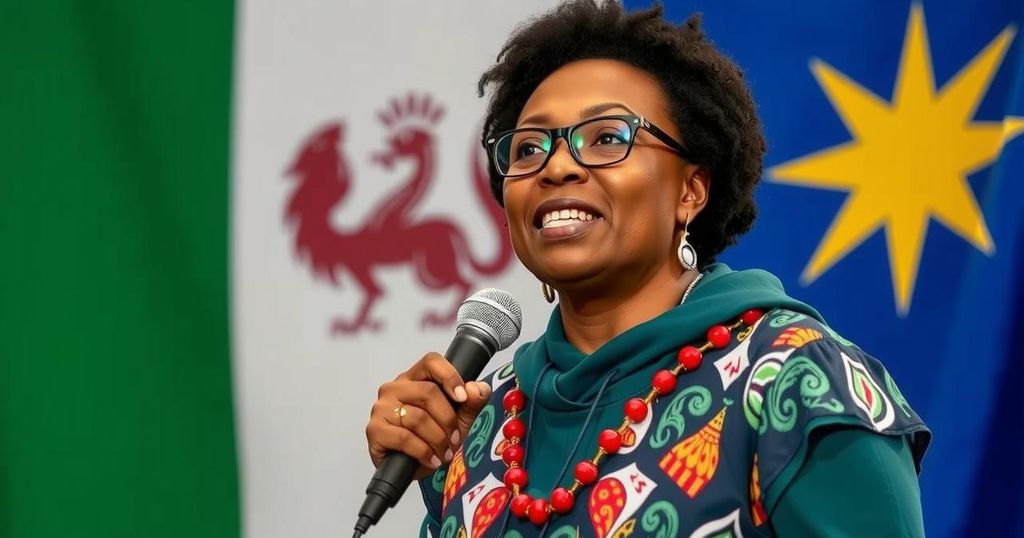World news
AFRICA, BOTSWANA, DEMOCRACY, ELECTIONS, ELECTORAL COMMISSION OF NAMIBIA, EUROPE, GERMANY, GOVERNANCE, GOVERNMENT, HA, INDEPENDENCE MOVEMENT, INDEPENDENT PATRIOTS FOR CHANGE, NAMIBIA, NANDI - NDAITWAH, NET, PAN, PANDULENI ITULA, PARLIAMENTARY SEATS, POLITICAL DYNASTY, SOUTH AFRICA, SWAPO, VP, WINDHOEK
Li Chen
0 Comments
Namibia Elects Its First Female Leader Amid Election Controversy
Namibia has elected its first female leader, Vice President Netumbo Nandi-Ndaitwah, who won the presidential election with 57% of the vote. Despite SWAPO’s continued power, opposition parties have disputed the election’s legitimacy, citing technical issues. Nandi-Ndaitwah, a veteran of Namibia’s independence movement, is set to face significant challenges ahead.
Namibia has made history by electing its first female leader, Vice President Netumbo Nandi-Ndaitwah, as the winner of last week’s presidential election. Official results announced Tuesday confirmed that the 72-year-old Nandi-Ndaitwah secured 57% of the vote, defying earlier expectations of a potential runoff. Her ruling party, SWAPO, has maintained a significant hold on power since Namibia’s independence in 1990. Meanwhile, opposition parties have rejected the results, arguing that election irregularities compromised the legitimacy of the vote.
The recent election was marked by technical difficulties, including shortages of ballot papers, prompting an extension of the voting period until Saturday. Critics within the opposition contend that this extension was unconstitutional, and they have expressed intentions to challenge the electoral outcome through legal avenues. Despite these controversies, SWAPO retained its parliamentary majority, a crucial distinction amidst regional shifts that have seen similar parties in neighboring countries, such as South Africa and Botswana, lose ground.
Nandi-Ndaitwah was an active participant in Namibia’s independence movement during the 1970s and was elevated to the role of vice president earlier this year following the passing of President Hage Geingob. She is poised to become the fifth president of Namibia since independence. The ruling SWAPO party celebrated the victory on social media, declaring, “SWAPO Wins. Netumbo Wins. Namibia Wins. Now Hard Work.” Notably, opposition leader Panduleni Itula received 25% of the vote and positioned his party, Independent Patriots for Change, as a significant force in the newly elected parliament while criticizing the election process extensively.
This article highlights a significant political milestone for Namibia, a nation that gained independence from apartheid South Africa in 1990. The ruling SWAPO party has dominated the political landscape for over 34 years. The election of Netumbo Nandi-Ndaitwah marks a pivotal moment, not only in terms of gender representation but also against the backdrop of challenges faced during the electoral process. Historical context regarding Namibia’s struggle for independence and the stability of its democracy adds depth to understanding the current political dynamics.
The election of Netumbo Nandi-Ndaitwah as Namibia’s first female president signifies a notable change in the nation’s political landscape. Despite the controversy surrounding the electoral process and the opposition’s rejection of the results, SWAPO’s continued dominance in both presidential and parliamentary elections positions it as a central player in Namibia’s governance. Moving forward, the newly elected administration faces challenges in addressing the concerns raised by opposition parties while striving to maintain the country’s democratic stability.
Original Source: abcnews.go.com




Post Comment